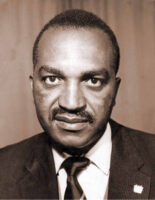
Jeremiah Joseph Mwaniki Nyagah is best remembered as a politician who opted to retire from politics to a village life, having served with distinction in the ministries of Agriculture and Education.
Born at Igari, Embu, on November 24, 1920, Nyagah started primary education in 1925 at the Anglican Missionary School at Kabare in present-day Kirinyaga County. Later, he was moved to Kagumo in Nyeri, where he sat the Standard Eight examinations. He then joined Alliance High School in 1937 (student number 427). From Alliance he went to Makerere College, Uganda, in 1940 for a three-year diploma course.
Nyagah had many firsts in his life. He was among the first Africans to sit the Cambridge School Certificate exam in Kenya. Among his classmates at Alliance were B.M. Gecaga (they later taught at Kahuhia, Murang’a, where politician Kenneth Matiba was their student) and Njonjo. From Makerere, Nyagah returned to Kenya in January, 1944, to begin a teaching career that he slowly combined with moderate politics. Between 1944 and 1958, Nyagah taught in various schools and colleges and became the first teacher of Kangaru School in Embu with only 30 students.
It was his appointment as an education officer that enabled Nyagah to criss-cross central Kenya, endearing himself to the moderates and the church leadership, especially in the Anglican Church. Before he was posted to Kiambu as an assistant education officer, Nyagah had a two-year break at Oxford University’s Department of Education for further training from 1952 to 1954. In this period, the Mau Mau war of liberation had started. Nyagah integrated the independent schools, run by the Kikuyu Independent Schools Association (KISA), into the leadership of District Education Boards (DEB). The schools were considered as education bases for subversion.
When — as a result of the Lyttelton Constitution — the colonial government called the March, 1957, elections to allow the first group of eight Africans to the Legco, Nyagah contested the Central seat. But he lost to a comparatively unknown South African-trained teacher, Bernard Mate, who won 51 per cent of the votes against Nyagah’s 12 per cent. Others in the race included Eliud Mathu, the first African at the Legco, lawyer David Waruhiu and Stephen Kioni, the first Kenya National Union of Teachers’ (KNUT) secretary-general.
In the Legco, the eight African representatives, under Tom Mboya’s leadership, pushed for an additional six African elected seats to bring Africans to parity with European legislators. This move forced Allan Lennox-Boyd, the British Secretary of State for the Colonies, to impose a constitution on Kenya in November, 1957, that created additional African seats. Nyagah vied for the new Embu seat in the 1958 elections and won.
Nyagah was a moderate politician and in 1960 he joined a small multi-racial band of idealists — known as Capricorn Society or, officially, as the Kenya College of Citizenship Association. The group believed that a future without racial discrimination would allow East and Central African countries to prosper. He was appointed the governor of the association in place of Musa Amalemba.
